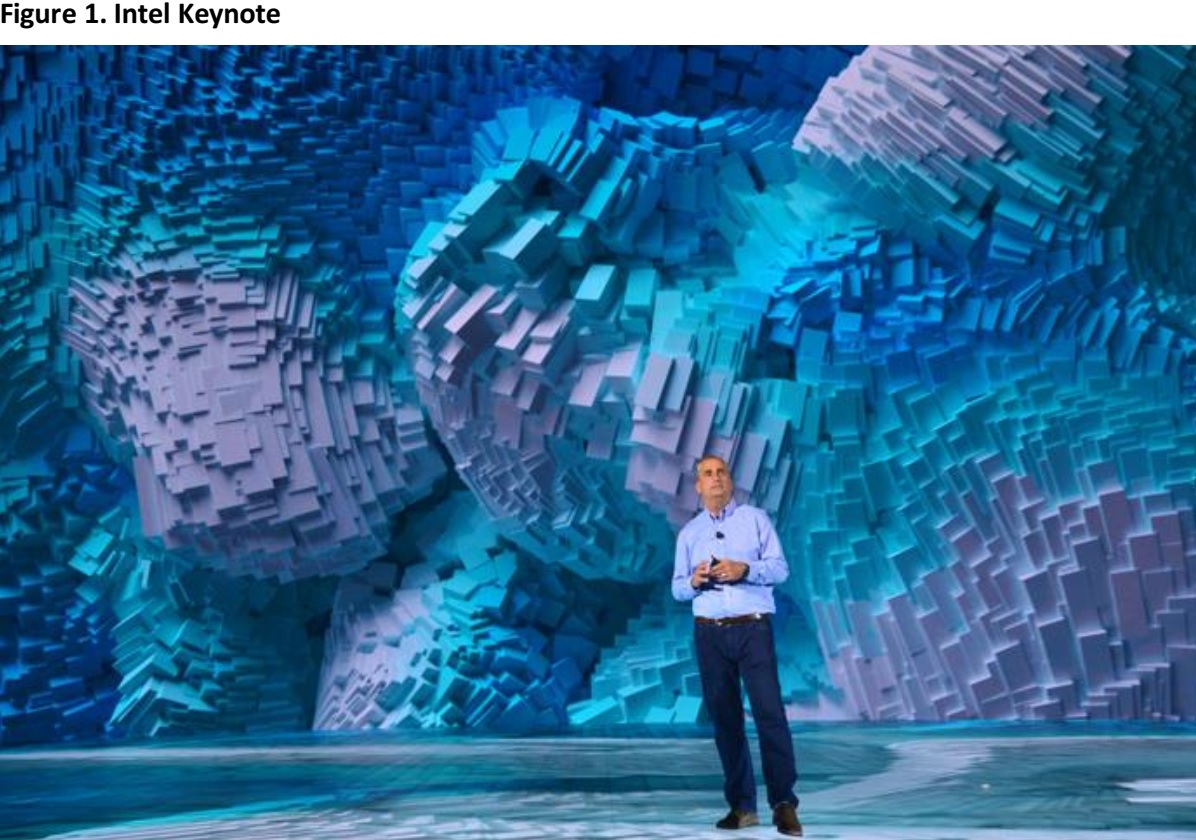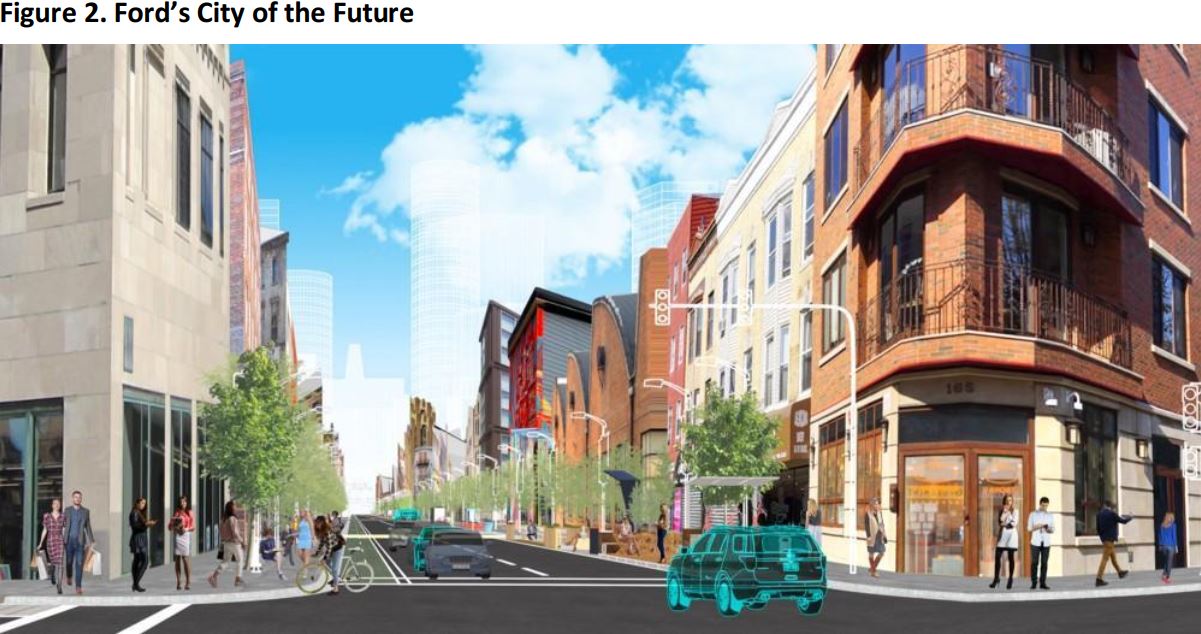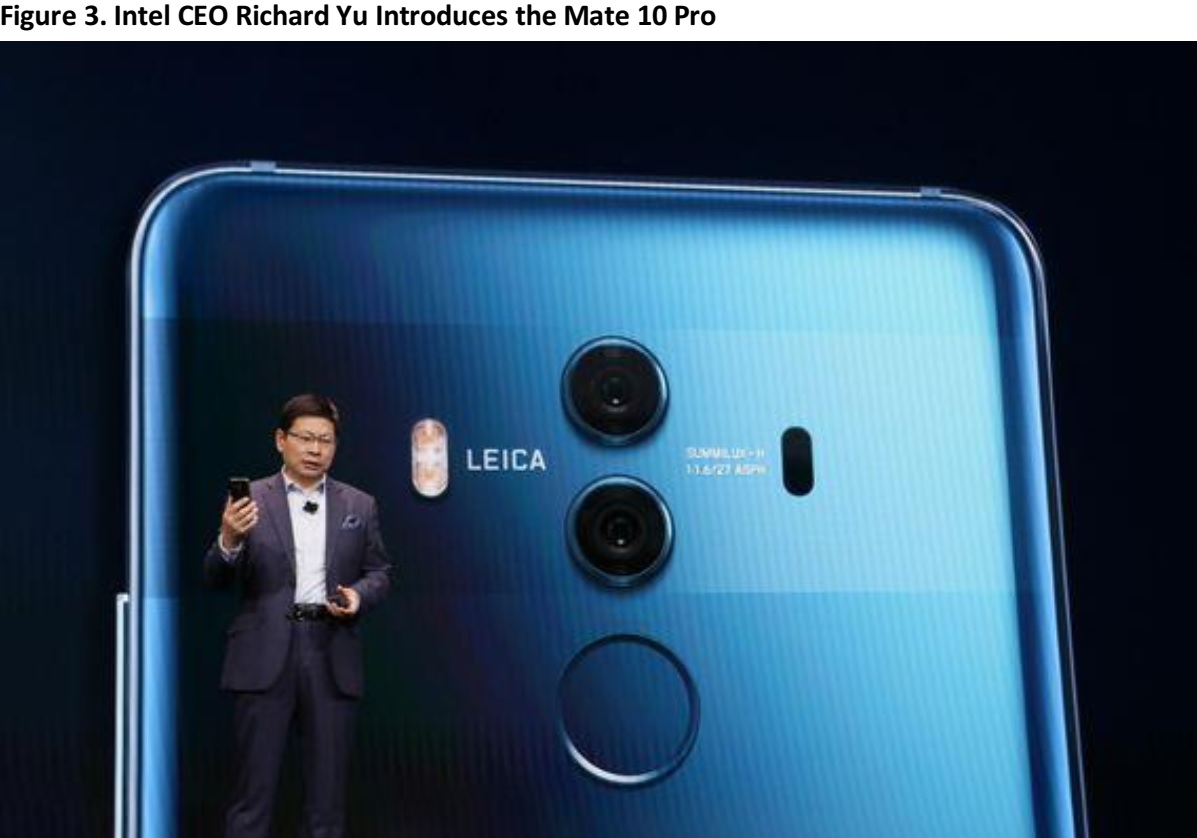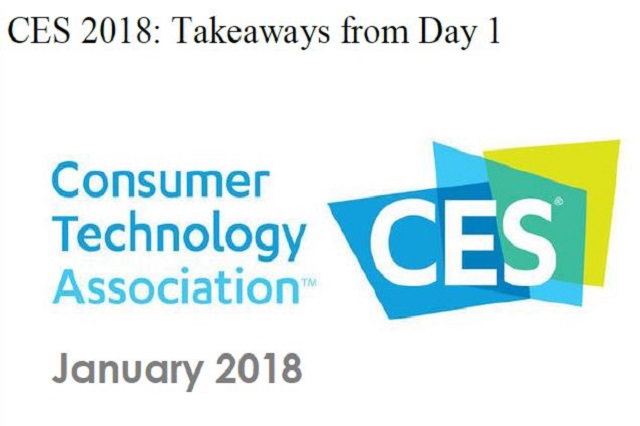1) Intel Demonstrated Huge Advances in 360-Degree and 3D Video that Have Been Achieved with Multiple Cameras and Massive Data Processing
Intel CEO Brian Krzanich began his remarks with a sort of apology for the recent security lapses in Intel processors called Meltdown and Spectre, but reassured that within one week, the company would issue fixes for 90% of the processors shipped within the last five years.
The topic of presentation was data. We, and autonomous vehicles in particular, will produce an enormous amount of data: 1.5 Gb per person and 4 Tb per vehicle per day by 2020. Intel has been honing its ability to process data, particularly for immersive video. The company has been using its True VR virtual reality platform, particularly for sports. It has developed technology around the voxel (volumetric pixel unit, as compared to a pixel [picture element] in 2D.) By using a large number of ultra HD cameras, Intel can produce 3D video representing the point of view of any player on the field, without the need of a helmet-mounted camera.
Intel Studios recently completed a 3D studio in southern California, and the company demonstrated a clip of a Western that could be shown from a variety of different vantage points without the need for reshooting the scene.
Intel also demonstrated its advanced chip for quantum computing and provided an update on its MobileEye acquisition. We were introduced to the autonomous MobileEye-outfitted car that Krzanich will start using to commute to work in to demonstrate the technology.

Source: Intel
2) Ford Is Developing a City-Centric Approach for Optimizing City Life and Managing Traffic from Pedestrians, Ride-Sharing Services, Bicycles and Autonomous Vehicles
Ford did not announce any new products at this year’s CES. Rather, CEO Jim Hackett discussed the company’s mission to provide benefits for society and how the city of the future can improve life for everyone. Hackett seemed to acknowledge that autonomous vehicles will be shared and that fewer of them will likely be needed, and as such, Ford is getting ahead of this future trend by developing citywide traffic management systems for autonomous vehicles, public transportation, ride-sharing services and pedestrians. This requires management of traffic lights and traffic in order to minimize travel time as well as the environmental impact. For example, street lanes could be flexible so as to accommodate traffic and occurrences such as construction, emergencies or special events. This will require vehicles with high-capacity wireless connectivity. Ford has developed a system, which it is testing on vehicles on its corporate campus, and has signed up a major city that has yet to be announced.

Source: Forbes
3) Much Work Still Needs to Be Done to Make Our Connected Home Devices Secure, Either Through Industry or Government Regulation
The panel discussion “Privacy and Support: Creating Seamless Connected Experiences” discussed the complicated installation procedures of many connected home intelligent appliances and their security. In one survey, a significant majority of respondents considered the privacy of their data very important, yet, a slightly smaller majority conceded that the data would probably be vulnerable to hackers. There remains much to be done in terms of making devices secure from hackers, and many devices still use common and trivial passwords. In terms of usability, devices need to simplify and obscure the underlying technology in order to make them consumer friendly. The panelists agreed that consumers do not need to worry about domain name servers or IP addresses on their home connectivity products.
4) Huawei Makes Its US Debut, Announcing the Advanced Mate 10 Pro Handset and Other Connected Devices
Today, Richard Yu, CEO of Huawei Consumer Business Group, introduced Huawei to the US audience and announced the availability of its Mate 10 Pro smartphone in the US. Huawei is the world’s largest telecommunications equipment company, with a strong.
worldwide presence, but is not well known in the US due to the US government ban on its telecommunications equipment. Nonetheless, the company has transformed itself from an unknown into a top global smartphone vendor. Its new Mate 10 Pro is the first handset to include an artificial intelligence (AI) chip for image processing and was designed to excel on the three measures that consumers care most about: battery life, image quality and download speed. The handset has more battery capacity, more antennas and a faster download rate, as well as a double camera with AI-assisted image processing, trouncing its rivals. The phone also operates in desktop or TV mode, and will be available from retailers in February. There is also a model from Porsche design for design aficionados. The company discussed several other consumer products, such as smart home protocols and a set of Wi-Fi routers.

Source: CNET
5) Creating Smart Cities Will Require a Huge Effort and an Enormous Amount of Data
Deloitte led a panel discussion on the realities versus the vision for realizing smart cities. When we talk about smart cities, we talk about being sensor-centric or citizen-centric. Governments are likely to look at citizen-centric solutions: data will go into the cloud and intelligence will be created, and it will be used to do something.
We are creating real-time data and using it to make decisions. For example, in terms of licenses—people are talking about how to better serve customers well, effectively and immediately. Who owns the data? This is one of the most complicated questions. There are many different kinds of data—application data and value added data—and it evolves over time, as well as various processes. 5G is going to be very important for certain kind of solutions, and 4G and LTE will be used as well.
Smart cities are all about change, which stems from leadership and a desire to do something bold and different. It will require steadfast decision-making and forming trusted long-term relationships. The conclusion was that governments need to assume a long-term perspective to see the change all the through.



